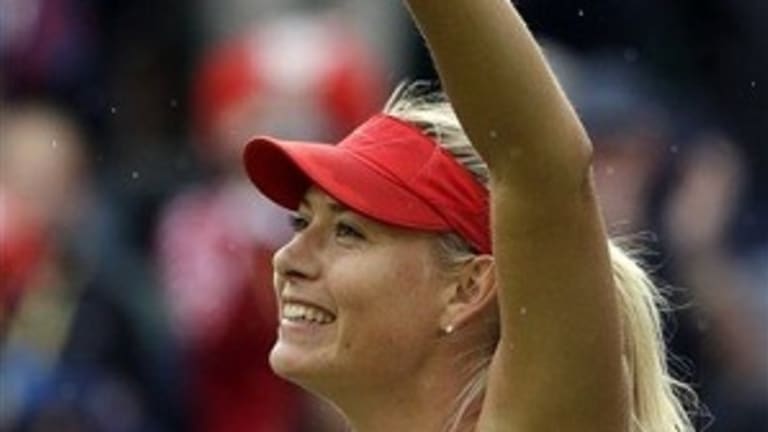Leading 6-2, 3-2, with a break in that second set of today's Olympic quarterfinal, Maria Sharapova of Russia cracked a big serve at Belgium's Kim Clijsters and loped toward the net, anticipating the dying quail of a return. She let the ball bounce and, close enough to the net to touch the let cord with her racquet, she smashed the ball into the webbing.
I think at that point legions of people around the world recognized that as the kind of utterly unexpected lapse in a seamless performance that can shatter even a dream-like spell of excellence — as well as lead the beneficiary of the largesse to take a deep breath, relax, and proceed with the work at hand. Things may not be so bad after all.
True to that strange reality, Clijsters played the rest of that game with a new and different level of enthusiasm, and a forehand winner and a strong rally that forced a Sharapova error left the Belgian at triple break point. Sharapova saved the first one thanks to a backhand error, but lost out in a rally during the next point. Suddenly, it was 3-all. And Clijsters was still in with a chance.
But the plot didn't unfold as neatly and tidily from there, which is another reality that the game shoves at us. For Sharapova was not rattled nor thrown off, nor did her game drop. Clijsters took momentary energy from that miniscule opening, but the important thing is Sharapova didn't back up or lose any, even after she was broken. After the predictable Clijsters hold for 4-3, Sharapova reasserted her authority by bolting to a 40-love lead; she gave up the next point but then won the game with an ace. It was 4-all.
After each woman held serve, Clijsters arrived at a moment of reckoning. For various reasons, including injury and lack of dedication, Clijsters hasn't played all that much tennis for a number of years now, while Sharapova has done very little but eat, drink, and sleep tennis ever since her return from career-threatening shoulder surger in early 2009. And today it both showed and paid off.
Sharapova mounted a furious effort and reached match point with a brilliant backhand pass. She broke at the first opportunity, when Clijsters made a timid backhand error off a service return. The Belgian's desire to stroll into Wimbledon with a paucity of experience and walk away with gold (or silver or bronze) was thwarted. And that was partly because someone as professional, competitive and gritty as Sharapova is the last woman you would want to meet under those circumstances.
As for her part, Sharapova played a terrific match. She hit four aces and, more important, double-faulted only twice. She hit more than three times as many winners as did Clijsters (25 to 8) and the women made the same number of unforced errors (20). That, in spite of the fact that Clijsters had an excellent 76 percent first-serve conversion rate. That it proved of so little value to her is a testament to Sharapova's aggressive, penetrating return — the single biggest factor in her success in what might be her career year.
Seeking her first Olympic medal, Sharapova will face her former doubles partner, Maria Kirilenko, in an all-Russian semifinal. Sharapova has won three of their five meetings with their last three clashes all going three sets,
